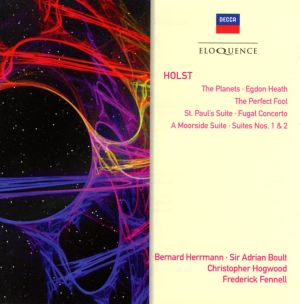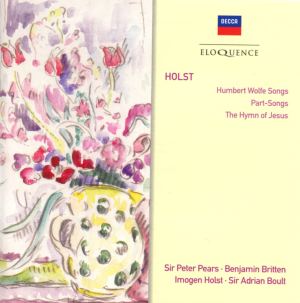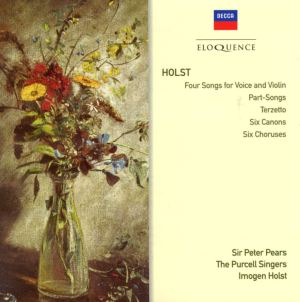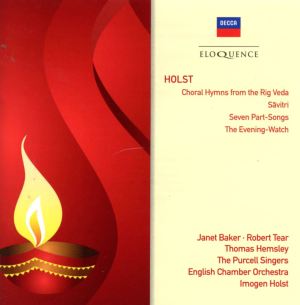 |
 |
| 

alternatively
CD: MDT
AmazonUK
AmazonUS |
Gustav HOLST (1874-1934)
The Planets, Op. 32 (H125) [57:02]
The Perfect Fool - Ballet Music, Op. 39 (H150) [10:40]
Egdon Heath, Op. 47 (H172) [12:44]
A Moorside Suite (H173) [14:24]
Suite No. 1 in E flat major, Op. 28a (H105) [9:08]
Suite No. 2 in F major, Op. 28b (H106) [10:41]
St. Paul’s Suite, Op. 29 No. 2 (H118) [12:32]
A Fugal Concerto, Op. 40 No. 2 (H152) [7:23]
 see end of review for performance details
see end of review for performance details
rec. 1955-1992. ADD/DDD
 DECCA ELOQUENCE 480 2323 [57:02 + 78:46]
DECCA ELOQUENCE 480 2323 [57:02 + 78:46]  |


alternatively
CD: MDT
AmazonUK
AmazonUS |
Gustav HOLST (1874-1934)
Twelve Songs to words by Humbert Wolfe Op. 48 (H174) [26:11]
Ave Maria, for unaccompanied female voices in eight parts Op.
9b (H49) [4:21]
Three Welsh Folk Songs arr. unaccompanied
chorus (H183) [7:22]
The Song of the Blacksmith arr. unaccompanied
male voices (H136) [1:14]
Two Part-Songs for unaccompanied
female voices [3:53]
Two Carols for unaccompanied chorus
[2:51]
The Hymn of Jesus, Op. 37 (H140) [21:48]
 see end of review for performance details
see end of review for performance details
rec. 1962-65. ADD
 DECCA ELOQUENCE 480 2327 [68:14]
DECCA ELOQUENCE 480 2327 [68:14]  |


alternatively
CD: MDT
AmazonUK
AmazonUS |
Gustav HOLST (1874-1934)
Four Songs for Voice and Violin, Op. 35 (H132) [7:25]
This have I done for my true love for unaccompanied voices,
Op. 34 (H128) [5:14]
Jesu, Thou the Virgin-born for unaccompanied
voices, Op. 20b (H82) [3:00]
Two Carols, with oboe and
viola (H91) [4:19]
Terzetto for flute, oboe and viola (H158)
[9:52]
Six Canons (H187) [6:25]
The Evening-Watch,
Op. 43 No. 1 (H159) [4:16]
Six Choruses, Op. 53 (H186) [17:18]
 see end of review for performance details
see end of review for performance details
rec. 1965-66. ADD
 DECCA ELOQUENCE 480 2328 [58:26]
DECCA ELOQUENCE 480 2328 [58:26]  |


alternatively
CD: MDT
AmazonUK
AmazonUS |
Gustav HOLST (1874-1934)
Choral Hymns from the Rig Veda, Op. 26 No. 3 (Third Group)
(H99) [12:33]
Sāvitri, Op. 25 (H96) [30:38]
Seven Part-Songs, Op. 44 (H162) [21:05]
The Evening-Watch, Op. 43 (H159) [4:19]
 see end of review for performance details
see end of review for performance details
rec. 1965. ADD
 DECCA ELOQUENCE 480 2329 [69:04]
DECCA ELOQUENCE 480 2329 [69:04]  |
| |
Rather than harbouring a phobia against late analogue era recordings
Australian Eloquence have made them a speciality. In this they
have been followed by Newton and a few others. Come on in; there’s
nothing to be frightened of unless you really cannot bear that
even and usually discreet level of background hiss. If you can
live with this slight shadow then there are musical rewards
to be harvested. And so it proves with these five CDs. The first
- a 2CD set - mixes 1950s mono (Fennell) with 1970s Phase Four
stereo and early 1990s digital. The remainder comprise ripe
1960s vintage Argo ZRG originals. One keeps hoping that Eloquence
will be given the entrée to other catalogues including
EMI for its late rarities such as the Abravanel Roy Harris Fourth
Symphony and CBS-Sony’s complete Ruggles orchestral works
from Michael Tilson Thomas but I suspect it’s not going
to happen.
The centre-piece of this clutch of Holst discs is Herrmann’s
Planets. It’s an eccentric version, it has to be
said. It’s the slowest I have encountered but has its
fascinations and rewards. And they are considerable. Herrmann
adds more than a minute to the modern mean timing for each planet.
He takes 57:02 against Holst (Naxos)
42:35, 1940s Boult (Beulah)
47:12, Boult 1979 (EMI
EMI),
Handley (Regis)
49:15, David Lloyd Jones (Naxos)
50:00, Previn (EMI)
50:15, Elder (Hyperion),
Owain Arwel Hughes (Warner)
50:57, Rattle 51:12 (EMI)
and Svetlanov (Brilliant)
[54:12].
Herrmann’s Planets starts well - very well. I cannot
recall another Mars sounding as baleful. One gains the
sense that some horror is wound up to pounce. The spectacular
brass growl with gnarled abrasion. The wild-eyed horns at 1:28
howl like wolves - never heard that effect before. The tattoo
at 5:24 is shod with cruel iron. Venus is flecked with
Hollywood star-dust and its mood is wondrously maintained. Mercury
here is rather viscous and ‘ploddy’. It’s
as if the young god had overindulged at dinner but it does deliver
a fresh perspective. Jupiter sports resinous wind and
a slow motion clarinet - like peeling obstinate cellotape off
a piece of cardboard. It’s all pretty vehement. The great
melody is really trolled out and emerges with stoic grandeur.
This darkly-intoned Saturn frequently brings to mind
Sibelius 4 and Tapiola. However what should be the terror-stricken
outburst at 5:20 is so ponderous it doesn’t really work.
Neptune has some uncannily steely harp glimmerings and
other arcanely whispered sounds at 0:48. It’s a strangely
beautiful world that both grumbles and gleams in a way that
recalls Bax’s Second Symphony. The final fade-out of the
choir seems electronically contrived rather than naturally sung.
So this is an enigmatic and very different Planets. I
liked it and if you feel jaded with ‘the middle way’
as represented by the great and the good do get this. You will
not be bored.
You might like to read David Trippett’s online biography
of Holst and Dr Len Mullenger’s article
on The Planets elsewhere on this site. There is also an
index for all
Holst reviews on this site.
The second disc in Volume 1 is packed to almost overflowing
with miscellaneously-sourced Holst. Holst, himself a trombonist
and here abetted by Boult, unleashes the instrument in the Dance
Of The Spirits Of Earth - the first episode of the ballet
music from the still-unrecorded yet highly entertaining opera
The Perfect Fool. This particular recording was always
one of the spectaculars of the LP catalogue. It still sounds
handsome and grippingly upfront. We need a recording of the
complete opera please. I could never understand why The Perfect
Fool with its fairy-tale charms and wit and Rimskian brilliance
languished while session-time preference was given to the much
lower key At the Boar’s Head.
The Hardy-inspired Egdon Heath has no surface glamour.
The tonality is mistily ambiguous. There’s even a touch
of Schoenberg there. The Black Dyke/Elgar Howarth Moorside
Suite is excellent - magnificent recording and snortingly
vibrant performance. Shame that all the movements are channelled
down to a single track.
The excellence of that Moorside recording does few favours
to the venerable Eastman/Fennell recordings of the two windband
suites. Cracking playing but that final March of Suite No. 1
is, I now find, just too fast as is the Dargason finale
of Suite 2. It’s as if Fennell is saying to you - I can
play it this fast and I’ll show you how! Stirs the blood,
right enough, but Holst comes only a close second. By contrast
The Song of the Blacksmith movement is just irresistibly
punchy. Grainger has a similar facility with emphatic vehemence.
Hogwood is flattered by a really modern recording - well 1990s,
anyway. His St Paul’s yields rewards in depth and
breadth of sound. The neo-classical Fugal Concerto has
reserves aplenty of sheer oomph and virile élan.
Britten’s admiration for Holst is attested to by his commitment
to Holst’s major song-cycle and by his undeniably imaginative
way in accompanying Pears in the Twelve Humbert Wolfe Songs.
Wolfe’s poetry can be treacly sentimental but more often
encompasses elusive worlds and visions. Pears’ precious
yet assertive way with the words shows commitment and delivers
a fine interpretative standard. Britten is superbly imaginative.
These songs share something with Fauré and Boughton -
the latter in his most symbolist Celtic moments. Betelgeuse
has distance and inhumanity - a strange and brave song with
which to end. Holst’s uncompromising integrity stares
out unblinkingly into a remote infinity. It delivers an applause-defying
ending to the cycle.
The nine choral items launch with a delicate Ave Maria.
Things find their feet with Three Welsh Folksongs. The
prize of the three is the slow-stepping My Sweetheart’s
Like Venus. The Song Of The Blacksmith will be well
known from the counterpart movement of the Suite No. 2. It is
also a swinging masculine partner to Dyson’s The
Blacksmiths.. The female voice Partsongs H92
and H119 are suitably gentle while the Two Carols for
mixed voices are more extrovert and touch on the Moeran-Warlock
toping song territory.
In the same realm as Betelgeuse is The Hymn of Jesus
- exotic and elusive. It is dedicated to RVW and is Holst’s
mystical response to WW1 as was RVW’s
Pastoral
Symphony, Delius’s
Requiem
and Foulds’ strangely conventional and less successful
World
Requiem. The Holst is a mysterious yet triumphant hybrid
of Middle Eastern mood and Greek Orthodox church censers. There
are also parallels to be drawn with Szymanowski though the Holst
is never as lush as the Song
of the Nightor Krol
Roger. This is a classic recording which has not been
excelled. A delicate hushing analogue background is a presence
you have to accept. The spoken incantatory choir, the rising
female waves of praise and grand orchestral rhetoric all register
affirmatively. Divine grace is dancing sounds very much
like Constant Lambert (10:00). Finzi might also have imbibed
the influence in the dancing episodes in Intimations
of Immortality. The more chaste moments recall in beauty
Holst’s own wonderful Whitman setting of Dirge For
Two Veterans paralleled by RVW’s in Dona Nobis
Pacem. This 1960s Hymn of Jesus - a valiantly unfashionable
Decca endeavour at the time - is one of Boult’s classic
recordings. It is amongst the best things he ever did alongside
the Holst
Choral
Symphony, Bax’s
Northern
Ballad No. 1, Moeran’s
Symphony and RVW’s
Dona
Nobis Pacem. The Holst work surely inhabits the realms
of the celestial spheres and of the angels. It fades into an
ineffable Neptune-like silence having wrought a potent
spell.
If I prefer Felicity Palmer in a 1972 radio broadcast of the
Four Medieval Songs this does not deafen me to the spare
passions and careful weighed balances of the version by Peter
Pears and Norbert Brainin. This I have done has the pristine
exhalation of a winter morning’s sunshine-dappled carol.
The Two Carols with oboe and viola have a suitably antiquarian
accent with nice interplay between voices and viola and oboe
and some delightful dancing figuration in Terly Terlow.
Those two instruments are joined by the flute for the Terzetto
in a work woven through and through with Warlockian regret.
The Curlew is not far away in the first of the two movements.
In the second Holst’s cooler neo-classical manner emerges
as in the Fugal Concerto and Fugal Overture. The
Six Canons are beautifully complex and much interwoven
with grace and joy. They sometimes indulge in a nicely varied
and angularly piquant jollity. Notice the analogue hush. Viola
Tunnard’s perfectly judged piano pulse in Evening On
The Moselle is memorable. Good to see her name again and
be reminded of her manifest artistic virtues. In The Evening
Watch is that Ian Partridge as the solo voice. The same
piece is repeated across two of the discs. The Six Choruses
H186 with the ECO mix of sacred and profane jolly and touch
of Moeran’s drinking songs but it not all carousing witness
the serenading a love song. Trudging stoical strings of Intercession.
Piercing Herrmann-like stab of Good Friday - the pierced
side of Christ recalled. March is perhaps a shade too
quick. The walking holidays of Holst and RVW pervade the rhythmic
voices in Good Friday. Before Sleep is calming
and haunts the drowsy and wakeful realms. The subtle harmonic
gouache of The Evening Watch is repeated in Before
Sleep.
The final disc touches on Holst’s passion for things oriental.
Thus we have the delectably rippling Choral Hymns from the
Rig Veda, Op. 26 No. 3 (Third Group) (H99). As Sheherazade
outwitted the calif at some cost to her storytelling resources
so Savitri yet more craftily trounces Death (strange
how he sticks to the bargain) in the 30 minute opera that bears
her name. There’s a fine singing from the three solo voices.
Savitri and her lover Satyavan sound suitably passionate but
ever so cut-crystal English. Baker is velvety of tone and yet
she can sing with an approach towards girlish naivety as in
the final scene. The whole conception instrumental, choral and
solo is nicely judged and the ecstatic mingling of the choir
and Baker’s voice at 1:10 in Loneliness and pain are
ended is a treasure. This work functions as an extended
scena or perfectly balanced miniature opera. Holst here polishes
a rare mood and exotic atmosphere although the singing in this
version reeks of the English choral tradition. The Seven
Partsongs are delicate and ascetically eloquent. These graceful
and light-palated delights are enhanced by minimal instrumental
grace interjections. The soloist is Susan Longfield and she
proves something of a star. She could easily have been another
Felicity Palmer had she had her chance with the Four Medieval
Songs or indeed in Holst’s luxuriant Keats-based Choral
Symphony (review).
The austere lissom hum of The Evening Watch exercises
a powerful spell. It too is from the mid-1920s and now sounds
quite modern. The words for all the pieces are printed in full
in the booklet.
Those Rig Veda songs are captivating. If you would like
to explore further then you might like to be reminded that in
December 1984 Osian Ellis (also the harpist on this disc), the
Royal College of Music Chamber Choir, the Royal Philharmonic
Orchestra all conducted by Sir David Willcocks recorded the
four sets of Hymns. They were issued complete on Unicorn-Kanchana
DKP(CD)9046. That CD was filled out with the Hymn to Dionysus
and The Two Eastern Pictures. It won’t be easy
to track down. Quite apart from the Hymns we also have The
Cloud Messenger on Chandos (review)
and, remaining to be recorded, the grand opera Sita of
which we have heard only the Act III interlude on Lyrita SRCD209
(review).
The same Lyrita also presents the tone poem Indra.
I should add that two of the five discs have been issued previously
as part of the Holst volume of the Decca British Music Collection
(review).
There we have it. A great deal of largely unfamiliar Holst at
bargain price. We also have a revival of his most performed
orchestral piece in a pleasingly disorientating and controversial
reading that ranks with ultima thule readings of Bernstein’s
BBCSO Enigma
and Golovanov’s
Mendelssohn Scherzo. The 1960s Argo originals carry the
standard high and complement Lyrita’s Holst discs on SRCD222
(Adrian Boult) and SRCD223
(Imogen Holst).
Rob Barnett
Performance details
4802323
The Planets [57:02]
London Philharmonic Orchestra/Bernard Herrmann
The Perfect Fool [10:40]
Egdon Heath [12:44]
London Philharmonic Orchestra/Sir Adrian Boult
A Moorside Suite (H173) [14:24]
Grimethorpe Colliery Band/Elgar Howarth
Suite No. 1 in E flat major, Op. 28a (H105) [9:08]
Suite No. 2 in F major, Op. 28b (H106) [10:41]
Eastman Wind Ensemble/Frederick Fennell
St. Paul’s Suite, Op. 29 No. 2 (H118) [12:32]
A Fugal Concerto, Op. 40 No. 2 (H152) [7:23]
Julia Bogorad (flute); Kathryn Greenbank (oboe); Saint Paul
Chamber Orchestra/Christopher Hogwood
rec. Eastman Theater, Rochester, New York, United States, May
1955 (Suites Nos. 1 and 2); Kingsway Hall, London, UK, March
1961 (Egdon Heath, The Perfect Fool), February 1970 (The Planets);
Town Hall, Huddersfield, United Kingdom, June 1976
(Moorside Suite); Ordway Music Theater, Saint Paul, Minnesota,
USA, May 1992 (St. Paul’s Suite, Fugal Concerto).ADD
4802327
Twelve Songs to words by Humbert Wolfe Op. 48 (H174)
[26:11]
Sir Peter Pears, tenor Benjamin Britten (piano);
Ave Maria, for unaccompanied female voices in eight parts
Op. 9b (H49) [4:21]
Three Welsh Folk Songs arr. unaccompanied chorus (H183)
[7:22]
The Song of the Blacksmith arr. unaccompanied male voices
(H136) [1:14]
Two Part-Songs for unaccompanied female voices [3:53]
Two Carols for unaccompanied chorus [2:51]
The Purcell Singers/Imogen Holst
The Hymn of Jesus, Op. 37 (H140) [21:48]
BBC Chorus; BBC Symphony Orchestra/Sir Adrian Boult
rec. Kingsway Hall, London, United Kingdom, March 1962 (The
Hymn of Jesus), December 1965 (Humbert Wolfe Songs, Ave Maria,
Three Welsh Folk Songs, The Song of the Blacksmith, Two Part-Songs,
Two Carols). ADD
4802328
Four Songs for Voice and Violin, Op. 35 (H132) [7:25]
Sir Peter Pears (tenor) Norbert Brainin (violin)
This have I done for my true love for unaccompanied voices,
Op. 34 (H128) [5:14]
Jesu, Thou the Virgin-born for unaccompanied voices,
Op. 20b (H82) [3:00]
The Purcell Singers/Imogen Holst
Two Carols, with oboe and viola (H91) [4:19]
Edward Selwyn (oboe); Cecil Aronowitz (viola)
The Purcell Singers/Imogen Holst
Terzetto for flute, oboe and viola (H158) [9:52]
Richard Adeney (flute); Peter Graeme (oboe); Cecil Aronowitz
(viola);
Six Canons (H187) [6:25]
The Purcell Singers/Imogen Holst
Viola Tunnard (piano);
The Evening-Watch, Op. 43 No. 1 (H159) [4:16]
The Purcell Singers/Imogen Holst
Six Choruses, Op. 53 (H186) [17:18]
The Purcell Singers; English Chamber Orchestra/Imogen Holst
rec. Kingsway Hall, London, UK, December 1965 (This have I done
for my true love, Jesu, Thou the Virgin-born, Four Songs for
Voice and Violin, Two Carols, Six Canons, Six Medieval Lyrics,
The Evening-Watch), January 1966 (Terzetto). ADD
4802329
Choral Hymns from the Rig Veda, Op. 26 No. 3 (Third Group)
(H99) [12:33]
Osian Ellis (harp)
The Purcell Singers/Imogen Holst
Sāvitri, Op. 25 (H96) [30:38]
Janet Baker (mezzo) - Sāvitri; Robert Tear (tenor) - Satyavan;
Thomas Hemsley (bass) - Death; The Purcell Singers; English
Chamber Orchestra/Imogen Holst
Seven Part-Songs, Op. 44 (H162) [21:05]
Susan Longfield (solo); The Purcell Singers; English Chamber
Orchestra/Imogen Holst
The Evening-Watch, Op. 43 (H159) [4:19]
The Purcell Singers/Imogen Holst
rec. Kingsway Hall, London, UK, October 1965 (Sāvitri),
November 1965 (Rig Veda). ADD
|
|












